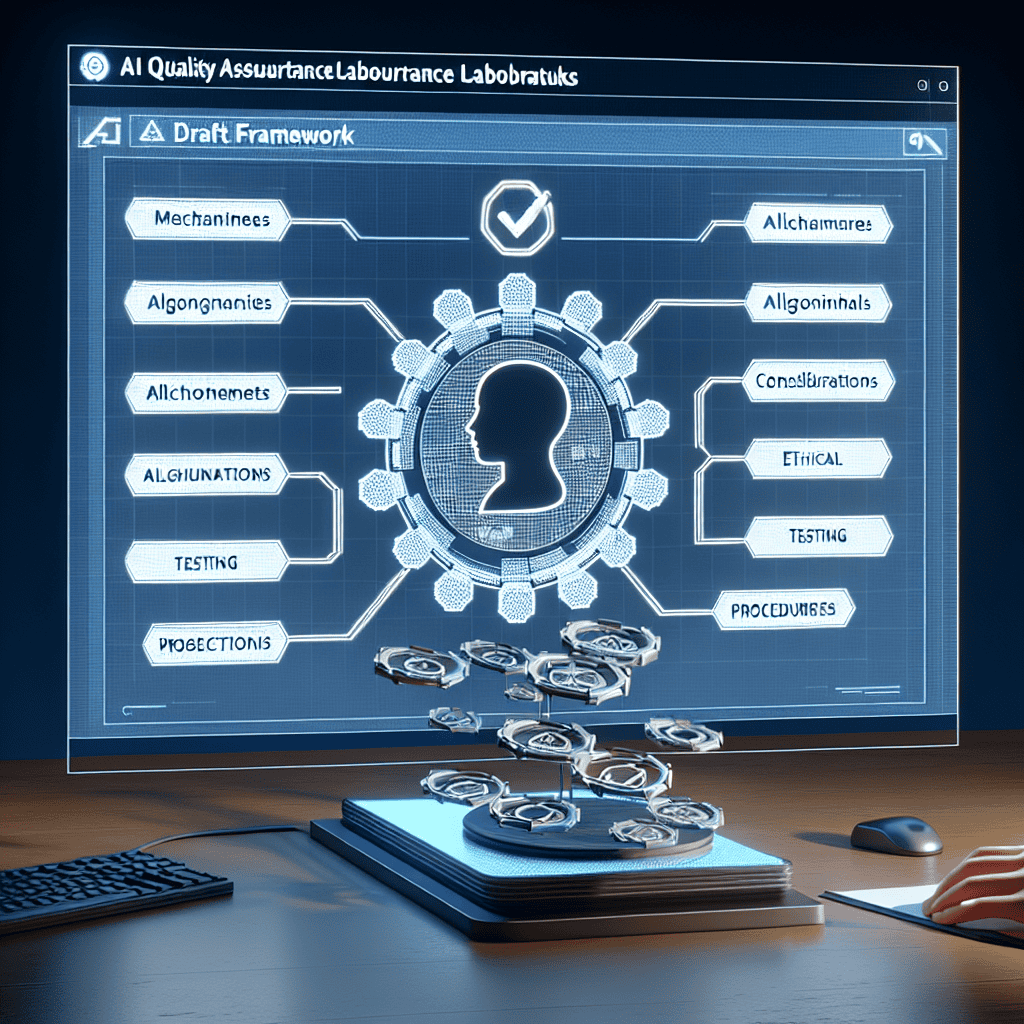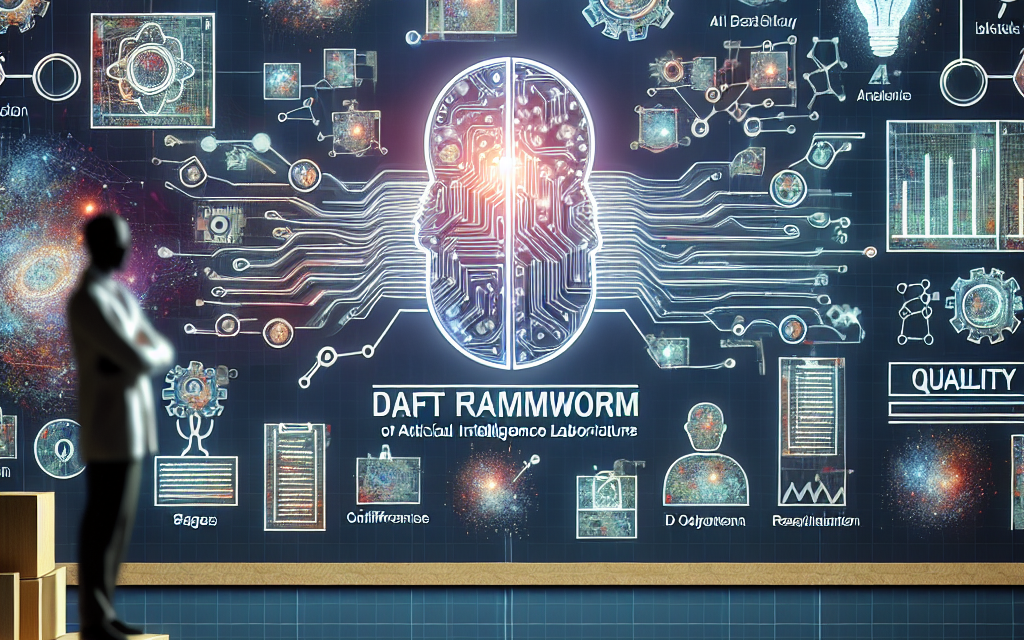CHAI Unveils Draft Framework for AI Quality Assurance Laboratories

In an era where artificial intelligence (AI) is rapidly transforming industries and societies, ensuring the quality and reliability of AI systems has become paramount. The Center for Human-Compatible Artificial Intelligence (CHAI) has recently unveiled a draft framework for AI Quality Assurance Laboratories, aiming to set a global standard for evaluating and certifying AI technologies. This article delves into the intricacies of this framework, exploring its significance, components, and potential impact on the AI landscape.
Understanding the Need for AI Quality Assurance
As AI systems become increasingly integrated into critical sectors such as healthcare, finance, and transportation, the need for robust quality assurance mechanisms has never been more pressing. The potential risks associated with AI, including bias, errors, and security vulnerabilities, necessitate a comprehensive approach to quality assurance.
AI systems are inherently complex, often operating as “black boxes” where decision-making processes are not easily interpretable. This opacity can lead to unintended consequences, such as biased outcomes or erroneous decisions. For instance, a study by MIT found that facial recognition systems exhibited significant racial and gender biases, with error rates up to 34% higher for darker-skinned women compared to lighter-skinned men.
Moreover, the rapid pace of AI development means that traditional quality assurance methods are often inadequate. Unlike conventional software, AI systems learn and evolve over time, requiring continuous monitoring and evaluation. This dynamic nature of AI necessitates a new paradigm for quality assurance, one that is adaptive and forward-looking.
CHAI’s draft framework addresses these challenges by proposing a standardized approach to AI quality assurance. By establishing clear guidelines and criteria for evaluating AI systems, the framework aims to enhance transparency, accountability, and trust in AI technologies.
The Components of CHAI’s Draft Framework
CHAI’s draft framework for AI Quality Assurance Laboratories is built on several key components, each designed to address specific aspects of AI quality and reliability. These components include:
- Performance Evaluation: Assessing the accuracy, efficiency, and scalability of AI systems across various tasks and environments.
- Bias and Fairness Analysis: Identifying and mitigating biases in AI algorithms to ensure equitable outcomes for all users.
- Security and Robustness Testing: Evaluating the resilience of AI systems against adversarial attacks and other security threats.
- Explainability and Transparency: Enhancing the interpretability of AI models to facilitate understanding and trust among stakeholders.
- Ethical and Societal Impact Assessment: Examining the broader implications of AI deployment on society and ensuring alignment with ethical principles.
Each component is supported by a set of metrics and methodologies, providing a comprehensive framework for evaluating AI systems. For example, performance evaluation may involve benchmarking AI models against industry standards, while bias analysis could include demographic parity tests and fairness audits.
Case Studies: Applying the Framework in Real-World Scenarios
To illustrate the practical application of the framework, CHAI has conducted several case studies across different industries. These case studies highlight the framework’s versatility and effectiveness in addressing diverse AI challenges.
In the healthcare sector, CHAI collaborated with a leading hospital to evaluate an AI-powered diagnostic tool. The framework’s performance evaluation component revealed discrepancies in the tool’s accuracy across different patient demographics, prompting the hospital to refine its algorithms and improve patient outcomes.
Similarly, in the financial industry, CHAI partnered with a major bank to assess the fairness of its AI-driven credit scoring system. The bias analysis component uncovered significant disparities in credit approvals for minority applicants, leading to the implementation of corrective measures and enhanced fairness in lending practices.
These case studies demonstrate the framework’s ability to identify and address critical issues in AI systems, ultimately enhancing their quality and reliability.
The Role of AI Quality Assurance Laboratories
AI Quality Assurance Laboratories play a pivotal role in operationalizing CHAI’s framework. These laboratories serve as independent entities responsible for evaluating and certifying AI systems based on the framework’s criteria.
By providing a standardized assessment process, AI Quality Assurance Laboratories help ensure consistency and comparability across different AI technologies. This standardization is crucial for fostering trust and confidence among stakeholders, including developers, users, and regulators.
Moreover, AI Quality Assurance Laboratories facilitate collaboration and knowledge sharing within the AI community. By disseminating best practices and lessons learned, these laboratories contribute to the continuous improvement of AI quality assurance methodologies.
To support the establishment of AI Quality Assurance Laboratories, CHAI has proposed a certification program for laboratory personnel. This program aims to equip individuals with the necessary skills and expertise to conduct rigorous evaluations of AI systems, further enhancing the credibility and effectiveness of the laboratories.
Challenges and Opportunities in Implementing the Framework
While CHAI’s draft framework represents a significant step forward in AI quality assurance, its implementation is not without challenges. One of the primary obstacles is the lack of standardized data sets and benchmarks for evaluating AI systems. Without these resources, it can be difficult to conduct meaningful assessments and comparisons.
Additionally, the dynamic nature of AI technologies poses challenges for continuous monitoring and evaluation. As AI systems evolve, quality assurance processes must adapt to keep pace with new developments and emerging risks.
Despite these challenges, the framework presents numerous opportunities for advancing AI quality assurance. By fostering collaboration between academia, industry, and government, the framework can drive innovation and promote the development of new tools and methodologies for evaluating AI systems.
Furthermore, the framework’s emphasis on ethical and societal impact assessment aligns with growing calls for responsible AI development. By prioritizing ethical considerations, the framework can help ensure that AI technologies are developed and deployed in ways that benefit society as a whole.
Conclusion: The Future of AI Quality Assurance
CHAI’s draft framework for AI Quality Assurance Laboratories represents a landmark initiative in the quest for reliable and trustworthy AI systems. By establishing clear guidelines and criteria for evaluating AI technologies, the framework aims to enhance transparency, accountability, and trust in AI.
Through its comprehensive approach, the framework addresses key challenges in AI quality assurance, including performance evaluation, bias analysis, security testing, explainability, and ethical impact assessment. By operationalizing the framework through AI Quality Assurance Laboratories, CHAI seeks to standardize and elevate the quality of AI systems across industries.
While challenges remain in implementing the framework, its potential impact on the AI landscape is profound. By fostering collaboration and innovation, the framework can drive the development of new tools and methodologies for evaluating AI systems, ultimately contributing to the responsible and ethical advancement of AI technologies.
As AI continues to shape the future, CHAI’s framework offers a promising path forward for ensuring the quality and reliability of AI systems, paving the way for a more equitable and trustworthy AI-driven world.




